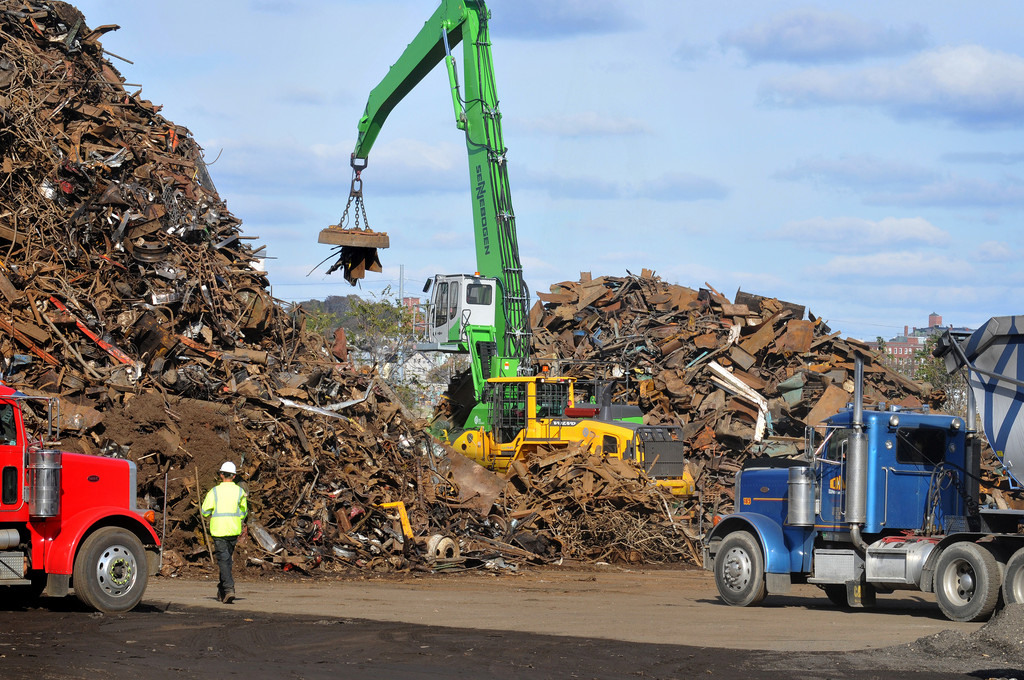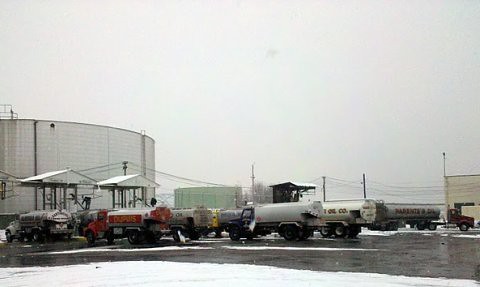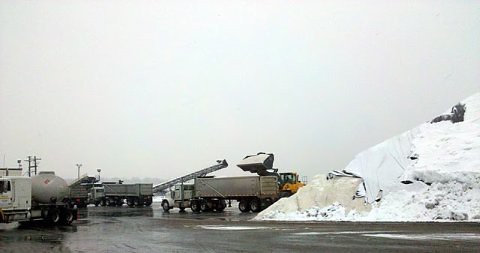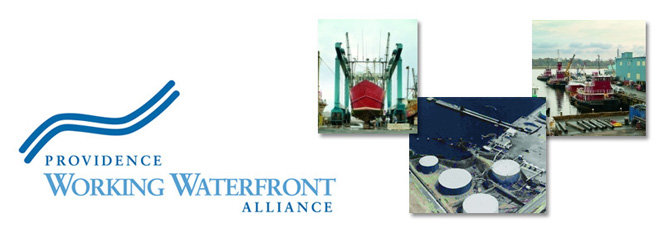In a recent New England Diary post author / blogger Robert Whitcomb praises Mayor Angel Taveras for adopting strong industrial zoning to protect Providence’s working waterfront from incompatible mixed uses.
Laud Taveras for helping to protect Providence’s working waterfront
All hail Providence Mayor Angel Taveras for signing an amendment to the city’s zoning ordinance to protect Providence’s working waterfront and port from being ruined by developers’ plans for condos and restaurants.
The port and industrial uses of the waterfront are what actually increase the region’s wealth, not speculative, property-flipping condo and other real-estate developers and low-paying “hospitality industry” jobs, many of which are highly seasonal. The area desperately needs the steady and well-paying “blue-collar elite” jobs provided by a working waterfront and port.
We have enough restaurants. We need a real economy.
The press release below was issued by Mayor Angel Taveras to announce the signing of a zoning ordinance to protect Providence’s working waterfront and nearby industrial businesses.
Mayor Taveras Signs Landmark Zoning Amendment to Protect Providence’s Working Waterfront
Tuesday, August 5, 2014
Mayor Angel Taveras today announced that he has signed into law a landmark amendment to the Capital City’s Zoning Ordinance to protect the working waterfront and prime the corridor for further job growth.
The amendment to Chapter 27 of the Ordinances of City of Providence changes zoning regulations to protect industrial and working waterfront uses along the Allens Avenue corridor from the Hurricane Barrier to ProvPort. The amendment was signed into law on July 24, 2014.
Mayor Taveras, City Council President Michael Solomon and business leaders who long advocated for the change said the amendment is expected to provide stability to area businesses.
“Hundreds of direct jobs and thousands of indirect jobs are based right here in the industrial waterfront of Providence,” said Mayor Taveras. “This amendment paves the way for the creation of more high-paying blue-collar jobs, brings the Zoning Ordinance into compliance with the City’s Comprehensive Plan, and sends a clear signal to companies worldwide that Providence is dedicated to supporting its industrial and working waterfront businesses.”
“The Port of Providence is one of our greatest economic assets, and the maritime industries and manufacturers along Allens Avenue demonstrate that Providence has a thriving working waterfront,” said Council President Solomon. “The updated zoning enacted by the City Council and Mayor protects these uses, and supports the City’s vision to expand manufacturing and industries that utilize our port and deep water access to create good-paying jobs and grow our economy.”
“The Providence Working Waterfront Alliance deeply appreciates the leadership of Mayor Taveras and the City Council in passing strong industrial zoning to protect the good paying blue collar jobs and critical resources that our area provides for the city, state, and wider region,” said Ellis Waldman, owner of Walco Electric and Chairman of the Providence Working Waterfront Alliance. “With this zoning in place, our businesses can continue to grow and take advantage of the port area’s deep water channel, rail, and highway access. These are precisely the unique infrastructure assets we should be investing in and promoting to grow Rhode Island’s economy.”
According to executives at Moran Shipping Agencies, a 77-year old Providence company and world leader in shipping husbandry, more than 90 percent of the world’s cargo is moved by water-borne transportation, vessels are getting larger and deeper in draft for economies of scale, and with the expansion of the Panama Canal, our port is well-poised for expansion.
“Our deep-water port just a few miles off the marine super highway provides Providence’s working waterfront and nearby industrial businesses access to capturing hundreds of millions of dollars in total economic impact,” said Gavin R. Black, in-house Admiralty counsel for Moran Shipping. “The port supplies the region’s energy, provides hundreds of good paying blue collar jobs, and thousands more related jobs. As the largest independently owned and operated steamship agency in North America today, we are a proud part of Rhode Island’s rich maritime heritage and deeply appreciate the leadership of Providence Mayor Angel Taveras and City Council President Michael Solomon, who understand the need to maintain industrial zoning for our working waterfront.”
The Providence Working Waterfront Alliance deeply appreciates the leadership of Mayor Angel Taveras and the City Council in passing strong industrial zoning to protect the good paying blue collar jobs and critical resources that our area provides for the city, state, and wider region. With this zoning in place, our businesses can continue to grow and take advantage of the port area’s deep water channel, rail, and highway access. These are precisely the unique infrastructure assets we should be investing in and promoting to grow Rhode Island’s economy. — Ellis Waldman, Chairman, Providence Working Waterfront Alliance
At a hearing before the City Council’s Ordinance Committee, the Providence Working Waterfront Alliance testified in favor of an ordinance to maintain and strengthen industrial zoning on Allens Avenue to protect the area’s marine and heavy industrial businesses. Below is the formal letter of support submitted by the Alliance:
On behalf of the Providence Working Waterfront Alliance (PWWA), I write today in strong support of the petition to amend the Official Zoning Ordinance of the City of Providence by changing the text of Section 303, the Use Table, W-3 and M-2 Zones only, and the text of Appendix A, to protect working waterfront and industrial businesses along the Allens Avenue Corridor.
Providence’s working waterfront and nearby industrial businesses generate hundreds of millions of dollars in total economic impact, supply the region’s energy, provide hundreds of good paying blue collar jobs, and thousands more related jobs. This vital regional economic resource must be protected from incompatible uses.
That is why for the past 7 years, the members of the PWWA have worked closely with the City Council, the Mayor’s Office, and the Planning Department to convey the importance of protecting Allens Avenue’s water-dependent and heavy industrial businesses from the threat of incompatible mixed-use residential and hotel development. Put simply, these uses are inappropriate in our heavy industrial neighborhood.
We were therefore pleased to see the City Council pass and Mayor Angel Taveras sign into law Providence Tomorrow, the City’s official Comprehensive Plan which calls for maintaining industrial zoning in our area.
Since passage of the Providence Tomorrow Comprehensive Plan, we have worked closely with the Planning Department to develop a zoning ordinance that implements and is consistent with the plan. The ordinance before you will accomplish this by maintaining and strengthening the W-3 and M-2 industrial zones along the Allens Avenue Corridor.
After many years of uncertainty, now is the time to finalize the zoning for Allens Avenue’s working waterfront and heavy industrial businesses. I ask that you support this ordinance which will provide area businesses with the certainty they need to invest in and grow their businesses.
Sincerely,
Ellis Waldman
Chairman
With storm after storm during a tough 2014 winter, the Providence Journal reports that many Rhode Island municipalities are running out of road salt. But thanks to our deep-water channel, the Port of Providence is set to receive a resupply vessel around March 1st. Another example of Providence’s working waterfront providing critical commodities that power our region’s economy.

Photo Credit: The Providence Journal/ Frieda Squires
http://www.providencejournal.com/opinion/commentary/20140130-john-everson-thriving-waterfront-belies-attack.ece
John Everson: Thriving waterfront belies attack
Patrick Conley’s letter of Jan. 24 (“Solomon hypocritical about ‘openness’ ”), blaming everyone but himself for his failed “Providence Piers” project, is filled with factual errors and near slanderous allegations. It is fair to say that his claims are as bankrupt as his project.
Mr. Conley inaccurately states that the City Council’s Ordinance Committee never held a public hearing on his proposal to rezone Allens Avenue’s industrial working waterfront to allow for an incompatible mixed-use hotel and marina fantasyland smack in the middle of an oil terminal, an asphalt plant, and a commercial repair shipyard. In fact, the Ordinance Committee held two public hearings in June 2010, where a majority of attendees spoke against his plan and in favor of maintaining strong industrial zoning to protect the area’s heavy industrial businesses.
Mr. Conley next conjures up a wild conspiracy theory regarding the sale of State Pier No. 1 by the Rhode Island Department of Environmental Management to the former Promet Marine, claiming that the Federal Bureau of Investigation should open an investigation into the transaction. The first place the FBI can look to is the Rhode Island Supreme Court, which in March 2008 handed down a decision (Tidewater Realty v. State of Rhode Island et al.) requiring DEM to sell the property to Promet Marine, which had previously leased the land from the state. In that case, the court found that the Providence Redevelopment Agency had improperly taken the property out from under Promet, which had initially bid for and signed a purchase-and-sale agreement with the state for the land.
Three years later, Promet sold its deep-water pier facility to Sims Metal Management, the largest publicly traded metals recycling company in the world. Sims has since invested millions of dollars in the property, creating new jobs and turning the pier into a world-class export facility. Sims made this investment precisely because of the property’s access to our 40-foot deepwater channel and industrial zoning.
As the owner of Narragansett Improvement, which has operated on Allens Avenue for over 120 years, I deeply appreciate the leadership of Providence Mayor Angel Taveras and City Council President Michael Solomon, who understand the need to maintain industrial zoning for our working waterfront.
While Mr. Conley’s ill-conceived project has gone under, the industrial businesses on Allens Avenue continue to thrive, providing hundreds of good-paying blue-collar jobs, generating hundreds of millions of dollars in total economic impact, and providing resources like oil heat, gasoline, asphalt and road salt that power our region’s economy.
John Everson is the owner of Narragansett Improvement and a founding member of the Providence Working Waterfront Alliance.
Today’s Providence Journal features a story on the large number of Rhode Island households that depend on home heating oil to stay warm during cold winters like the one we are currently experiencing. The vast majority of heating oil is supplied via tanker ships to terminals in the Port of Providence including Sprague Energy, Capital Terminal, and These terminals then supply a network of home heating oil distributors who deliver the product to homes across the state and wider region.
This is all made possible by our 40ft deep-water shipping channel and industrial zoning to protect the port’s terminals.
Another example of the role Providence’s working waterfront plays in powering our economy and providing the region with critical energy resources.
In a Providence Journal letter to the editor, Irving Sheldon argues that scrap is an important generator of economic activity. Indeed, scrap is Rhode Island’s largest export thanks to the Port of Providence’s deep-water channel, a key economic asset for Rhode Island and the region.
One man’s trash . . .
In her Oct. 23 letter, Theresa Quigley complains of the “junkyard” on the Providence waterfront. I don’t believe this is junk: It is valuable scrap metal which has been collected and will be loaded on ships, an important generator of economic activity.
Irving C. Sheldon
Saunderstown
According to a report by the Business Roundtable, Rhode Island ranked 10th in the nation with $641 million in scrap exports in 2012. These scrap exports are made possible by Providence’s deep water channel and industrial zoning for our working waterfront, a key economic asset for Providence, Rhode Island, and the wider region.

Providence Business News photo. Pictured: Sims Metal Management operation on Allens Avenue in the Port of Providence.
Saturday’s Providence Journal editorial compliments Mayor Angel Taveras and Providence Economic Development Director James Bennett for recognizing the value of the city’s working waterfront:
Saving Providence’s port
The dream of hotels, condos, shops and restaurants along Providence’s waterfront made for pretty pictures. But it’s a good thing that local business and political leaders stuck with keeping this area a working port – helping to maintain Rhode Island’s maritime industry and hundreds of high-paying blue-collar jobs.
There are more than enough pretty places in Rhode Island – and indeed Providence – to exploit for tourism and condo development without destroying one of the region’s key economic assets.
Mayor Taveras deserves credit for dropping the attempt of previous mayors to rezone the Allens Avenue area for extensive mixed use, something that would almost certainly have brought in condo/ hospitality business developers (and campaign contributors) while putting less glitzy (but much better-paying ) existing businesses at risk. City officials now plan to add only office development to the mix for the port area. The financial crash was aided and abetted by grotesque over-development of condos. Let’s get back to real, broad-based-wealth creators — trade, manufacturing and technological innovation.
The mayor and his economic-development director, James Ben-nett, clearly understand the importance of industrial jobs and a port infrastructure to Rhode Island’s future. This is a significant competitive advantage that Providence has over landlocked cities of the Mid-west, for instance.
Today’s Providence Journal has an excellent editorial noting the exciting news that Sims Metal Management has purchased Promet Marine. Sims’ investment in Promet’s deep-water pier is clear evidence of the tremendous value of the Allens Avenue working waterfront and the need to maintain industrial zoning to protect this critical state and regional economic asset.
Providence received some good news recently, with the announcement by Sims Metal Management, an international metals and electronics-recycling company, that it has acquired Promet Marine Services on Allens Avenue.
Promet, with a 600-foot pier served by rail and capable of berthing deep-draft ships, and some nine acres for shore-side operations, has long been a leader in the local marine-trades sector. With the sale, for an undisclosed sum, and the new owner’s intention to retain all current Promet personnel and hire more over the coming months, our marine industry seems stronger than ever, and likely to play a growing role in the city’s economy.
Scrap is in high demand in many markets around the world. Sims’s entry into the region should translate into higher prices for scrap from area manufacturers, helping them to hire more workers and reinvest capital.
This is the kind of development the Ocean State needs. It also speaks to the wisdom of having dredged the badly silted Providence River channel, in 2004.
The Providence Journal has an editorial noting the “sweet sound of scrap” being loaded onto ships in the Port of Providence, and why port operations should be protected from incompatible hotel and condo uses which inevitably result in resident noise complaints about heavy industrial activity:
The biggest export from the Port of Providence is scrap metal, all part of the noble, and in this instance profitable, effort to recycle what we discard. In recent days two large ships at the port have been loading scrap, and clanging has reverberated across the Providence River as hoppers suspended from huge cranes have been swung out over the ships to drop tons of the stuff into their cavernous holds, raising clouds of rust-colored dust.
It’s exciting to watch, and the sound should be music to the ears of residents of a region coming out of a long recession. The more activity in our commercial sector, the less we will have to extract from taxpayers to upgrade infrastructure and pay pensions.
Still, that doesn’t stop people from complaining, and underscores the danger of locating condos and hotels near the port, which would only increase the complaints. But the complainants are not totally devoid of our sympathy. Maybe if they had some peace and quiet they could study economics.
On May 6th, members of the General Assembly’s Port Study Commission visited Promet Marine to learn about the company’s marine repair operations and the critical importance of maintaining Rhode Island’s Type 6 waters for marine-industrial uses.
With yet another winter storm bearing down and continued cold weather forecast, Southern New England needs heating oil to keep homes and businesses warm, and road salt to keep our streets and highways safe for drivers. That’s why facilities like Sprague Energy’s Allens Avenue terminal in the Port of Providence — with a capacity to supply upwards of 1 million gallons of home heating oil and more than 150 trucks of road salt in a single day — are so critical to our region.
Below are pictures of home heating oil and road salt trucks being supplied on a busy winter day (January 25th) at Sprague’s Allens Ave terminal.


Don Church of Seaboats Inc. has an excellent opinion editorial in the Providence Journal about the critical role that barges play in supplying Rhode Island with gasoline and home heating oil, and how the Port of Providence is well situated to attract new coastal barge commerce:
Did you know that most of Rhode Island’s gasoline and home-heating oil comes into the state by barge? Without tank barges making those deliveries, we would all be a lot colder this winter! Rhode Island also exports ethanol via barge, a vital part of the state’s economy. The barge industry also provides opportunities for good-paying family-wage jobs. Rhode Island’s unemployment rate is the nation’s fifth-highest; expanding opportunities for maritime jobs is important. Because the Port of Providence is the only deep-water port in New England besides Boston, commercial waterways transportation is an economic engine for the region.
The Port of Providence recently won $10.5 million in federal funds to buy two harbor cranes to expand cargo handling and make the port more competitive. More cargo transported in and out of the port will mean more jobs. Port-related employment has increased 300 percent in the past 15 years. With over 30,000 Rhode Islanders out of work, Rhode Island’s historic maritime industry and the state’s ports could not be more critical.
Barging is the most economical and efficient mode of cargo transportation, given the enormous carrying capacity and fuel efficiency of a barge. One coastal barge can carry the same amount of liquid cargo as 336 tanker trucks. Without barge transportation, imagine the congestion that would result from thousands more trucks on our already clogged highways, not to mention the additional air pollution!
Barging brings us the home-heating oil that keeps Rhode Islanders warm in the winter without facing shortages and much higher costs. Barges also transport the bulk commodities that are the building blocks of the U.S. economy, including millions of tons of coal to power plants for electricity production, petroleum products to heat our homes and fuel our vehicles and airplanes, chemicals essential to our industries, concrete for construction projects and salt for our winter roads. Vital industries depend on barge transportation to deliver these commodities. Without barge transportation, the costs of these materials would skyrocket.
The barge industry is the safest and most environmentally friendly cargo transportation. Barging produces lower air emissions than rail or truck, and U.S. Coast Guard statistics show that more than 99.999 percent of oil transported by tank barges is delivered safely. In fact, tank-barge spills have declined by 99.6 percent since 1990. In 2009, tank-barge oil spills reached the lowest levels since 1973, when Coast Guard record keeping began. Spills from barges accounted for just 9.3 percent of marine- spill volume, less than tank ships, cargo ships and marine transportation facilities.
A study by the Texas Transportation Institute at Texas A&M University found that the fuel efficiency of tugboats and towboats combined with the superior carrying capacity of barges make barging the most efficient and affordable transportation mode for freight, compared with rail or trucking. The industry offers good jobs on its vessels, and thousands of other shore-side jobs depend on a vital waterways-transportation industry. It’s essential to Rhode Island.





